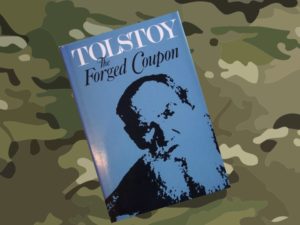
Of the things I enjoyed about my military deployments, one of the most unique was: free books.
Wherever I was deployed to around the world, there was always a room, a tent, a building, in which books were donated to be sent overseas to the troops. Inevitably, I always returned from these overseas tours with more books than I went with. I could typically be found browsing through tables and bookshelves full of free literature. I’ve found hardbound editions of The Three Musketeers printed in the 40s, and a really neat edition of Crowded Hours by Alice Roosevelt Longworth in the embassy in Mauritania.
One of the most impactful books that I picked up, though, was the one I snagged during my first deployment to Bosnia in 1995: The Forged Coupon, by Leo Tolstoy. This book resonated with me on several different levels at different points in my life, but the main point that I have taken from it has been constant from the first time I read it: ultimate evil is only overcome by someone who is strong enough to absorb it’s impact and not pass it on.
If you haven’t read it, I highly recommend it. There is no way that I can do it justice with the space I have available here, and it is a pretty short and easy read. Of course, it is a Russian novel, so expect a complicated cast of characters, but the message of human interaction is easily understood.
The story begins small, with an conflict between a father and his son. The father has a bad day at work, and the son is asking for an advance on his allowance, which the father refuses to give; instead, there are insults and bitterness.
The boy owes money to a friend; he asks advice from another friend, who is a less than savory character. This “friend” recommends that they forge the money and pass it off to a local shopkeeper’s wife in order to settle the debt. Small crime, yeah? No major issues.
The shopkeeper’s wife doesn’t notice the con. The shopkeeper does, however, and is angry with his wife…but passes the forged note on to a peasant selling wood. The peasant gets arrested for later passing the forged note, and each wrong is compounded on another, passing the story down the line. The shopkeeper bears false witness against the peasant, a witness to the transaction committed perjury, and is later fired by the shopkeeper for theft. The story continues, passing injustice along from character to character, culminating in horse theft (grand theft auto, in those days), manslaughter, and serial murder.
The culmination of the first half of the book ends when a serial murderer is faced with a victim that does not condemn, but instead asks, “how can you destroy somebody’s soul…and worse, your own?” at the precise point of death. That act…being more concerned about his soul that her own life…causes the murderer to repent, be held accountable, and the second half of the book is similar to the first half, only in the other direction. Good deed builds on good deed and is passed on through each of the characters until ending with a reconciliation between the original father and son.
Be advised, there is a large amount of condemnation of what was seen as hypocrisy against organized religion, as Tolstoy wrote this after the Russian Orthodox Church excommunicated him. Not that it’s relevant here, but it is pretty on-the-nose in the book.
So great story, right? What is this, a book report? As I mentioned at the beginning, this book had a pretty big influence on my own personal world view. The idea that evil…or anything negative, such as badness, anger, bullying, condemnation…can be stopped by someone strong enough to absorb it, endure it, without passing it on to others. It could be seen as naïve, sure, but let me give you a few examples.
Service members do it, as do other first responders like firefighters and law enforcement. We place ourselves in dangerous situations so that others don’t have to. We bear the weight of deployments, we fight and sacrifice, so that other’s don’t have to. There are hundreds of other reasons, to be sure, but the strength in veterans is that they are able to build their strength in order to bear much on behalf of our nation.
Leaders do it, on behalf of their teams. When a crisis happens, or a customer goes on a rampage, a good leader will absorb the impact of the criticism without passing on the frustration, anger, and bitterness to their subordinates. By providing that type of “top cover”, the employees are able to address the issue and solve the problem rather than focusing on their own negative feelings. Again, as long as the leader is strong enough, mentally or emotionally, they are able to keep the chain of negativity going.
In my own profession, counselors and therapists most certainly do it. I recently read an amazing blog by another therapist that describes the experience of absorbing what we hear rather than passing it on to those we care about. Doc Warren uses the analogy of John Coffey from the Green Mile and his supernatural ability to remove the pain of others, while still feeling that pain himself.
Don’t get me wrong, I’m not talking about suppression or turning a blind eye to bad stuff. I’m talking about addressing the problem in a productive way rather than compounding negativity with negativity and making the situation worse. If injustice is happening, address it appropriately, solve the problem constructively. Those who absorb the evil, offload it in a healthy way, rather than passing it along.
The world is changed by individuals and their relationships, rather than by huge movements. One of the best ways to do this is to absorb negativity without passing it on…we can do with a lot less negative in the world.



